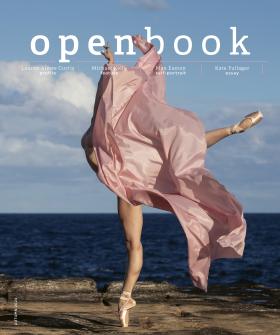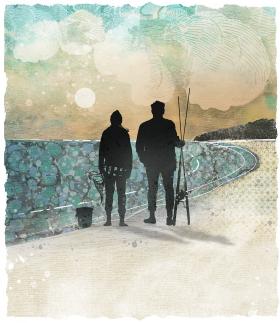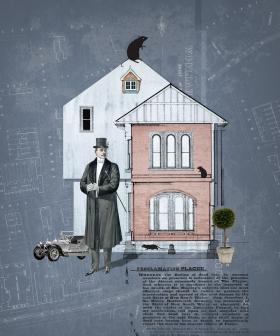At the hospital they jolted Franco out of the ambulance, wheeling him, floppy and unresisting, into Emergency. Doctors and nurses were already waiting. They rushed him through heavy swinging doors but they held me back.
‘This one needs bagging,’ the paramedic called to the doctors, his words echoing through the rebounding doors.
What the fuck is bagging?
I sagged outside, my face pressed up against the tiny window, shivering against the sudden onslaught of air conditioning. I couldn’t see Franco, just an assortment of medical machines. Outside the bright buzz of that room, the hospital seemed deserted. I pushed myself away from the window and wandered down a hallway, looking for assistance. Tucked away, around a few corners, was a lone woman sitting behind a brightly lit bench.
I approached her, shaking.
‘My boyfriend’s been in a car accident, we just came in the ambulance,’ my mouth filled up, wet and salty. ‘My neighbour’s got my kids, and I came without my phone or purse,’ I stuttered. ‘Could I have some money to use a pay phone and call her?’
The woman reached down beneath the bench and handed me the white hospital phone. I dialled Meg’s number. Besides Franco’s, it was the only number I still knew.
‘Meg, I’ve come up in the ambulance,’ I blurted. ‘He was hurt this time. The ambos said head injury and brain swelling, but no-one’s talking to me.’
‘Oh Lil,’ Meg’s sigh was ragged.
I cried softly into the end of the phone, my body juddering. The woman behind the desk glanced up at me sadly.
‘I better go, I’m on the hospital phone. I’ll call you when they talk to me, okay?’
The woman behind the desk put the phone back down beside her without a word.
I walked back to the doors of the room they’d taken Franco into, peering inside the tiny windows, but there was nothing more to see. Stunned, I watched the lights on the machines. If it wasn’t for their rhythmic movements, I would have believed time had stopped.
A nurse walked past the window and glimpsed my face. She opened the door a sliver. I couldn’t see past her.
‘You can’t stand there,’ she said. ‘I’ll show you somewhere you can sit.’
She led me off to the side and opened up a small door. Inside was a couch pushed up against locked double doors. There was a trolley with cups and tea and coffee.
‘The jug’s there,’ the nurse said, pointing to a sink with an electric jug.
‘Can you tell me what’s happening?’ I stammered. ‘Is he alright?’
‘Hasn’t anyone spoken to you?’
‘No. I don’t know anything. I came in the ambulance but they wouldn’t let me in that room.’
‘Are you his girlfriend?’
I wondered if I should try to explain who Franco was to me — my high school sweetheart, my first love, the father of my kids. It all seemed too hard.
‘Yes,’ I said simply.
‘Were you in the car?’
‘No, he was with mates. We just live down the road. I came to pick him up.’
‘He has a very high blood-alcohol reading. Was he the driver?’
I shook my head. Not this time.
‘The doctor will be in to see you soon,’ she stated, closing the door behind her.
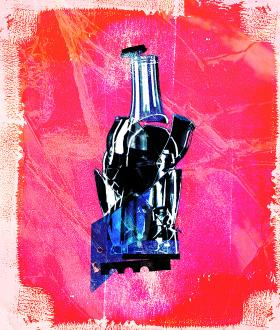
On the afternoon of the car crash, we’d had a barbeque at home. Franco didn’t bring friends home often — it was too far out of town. I’d made a new skirt in the morning, blue and red and printed with abstract flowers. I wore it at the barbeque, though it felt slightly too bold for the daytime. Outside on the grass I was overdressed amongst the T-shirts and board-shorts of the men. I’d sewn the skirt a touch too long, and with bare feet I kept stepping on the hem. I chatted with Franco’s mates, who drank their beer and tried not to look away from my eyes as I spoke. They seemed strangely afraid of me, as though I might at any time say something wholly unexpected or unbearable.
My small sons danced about, delighted with this sudden audience of men. They clambered on their backs and begged for rides, pulled them out to the swings and asked for pushes and raced around to find their favourite toys and offer them up for inspection. Oscar and Noah were enchanted but I looked on with rising horror as my sons pushed out their chests
and laughed uproariously at jokes they couldn’t understand, mimicking within minutes these outward displays of manhood.
On the table the empty beer bottles began to swell and I felt a knot forming deep in my belly. How much would the men drink? How long would they stay?
Franco’s mates started to gather, as if to leave. My children came to stand beside me.
‘We’re going to go down to touch footy,’ Franco told me. ‘We’ll play and then come back to eat.’
His dimples flickered on his cheeks, and I knew he was already drunk.
‘But who’s driving?’ I asked, looking across at the sprawl of beer bottles.
‘Well, it won’t be fucking me,’ he shot back, his dimples deep, his smile defiant.
I thought of all the times he’d driven home drunk, of all his near misses. Franco had crashed his car five times on the long way home, and each time had stepped from
the wreckage unharmed, without even a scratch.
Today I’d thought him safe, at home, bringing the party with him, but now this last-minute adventure down to the footy grounds. I felt my eyebrows tighten, but I looked
at the ground as the men headed in a pack towards their cars.
Oscar and Noah drooped with disappointment beside me.
In the quietness left behind, I cooked pasta and sat down at the table to watch my children eat.
‘Why don’t you marry Daddy?’ Noah’s voice was muffled, his mouth full of spaghetti.
I studied the sauce-smeared face of my youngest son and shook my head with a smile. ‘Nup.’
‘Daddy’s too exhausting.’
Noah’s tone was commiserating.
‘Men like Daddy shouldn’t shave,’ Oscar proclaimed loudly.
‘Why do you say that?’ I asked.
‘Because he always gets the shaving cream on his ears.’
I tried to hide my smile.
‘What sort of man is Daddy?’
Oscar glanced at me as though I had asked the most basic, most obvious of questions.
‘Silly.’ He turned his sauce-speckled palms upwards in a gentle shrug. ‘Daddy’s a silly sort of man, you know?’
Two sets of orange lights flashed in the distance, illuminating the night sky. My arms felt wooden on the steering wheel. Big white ambulances parked in the middle of my small-town road.
No-one said anything about ambulances.
I pulled up on the grass and clambered out the car door. The wreck of Franco’s car lay abandoned further along the road. His car was strangely rounded, all the sharp edges smoothed away, the red paint scratched off, revealing the silver of the metal beneath. In the flare of the ambulance lights the shattered glass on the bitumen sparkled intermittently. I looked down
at my bare feet.
There is glass everywhere but I have to cross.
Gingerly, I picked my way through the broken glass. The nearest bloke lay on his back with his knees raised. His face was criss-crossed with thin bloody lines, his nose large and swollen, his eyes already turning black.
‘Lil, I’m okay. They just told me to lay down ‘cause I felt dizzy.’ He sounded forlorn, anxious. ‘I’m so sorry, Lil.’
‘Sorry for what?’ Heart banging. ‘Where is he?’
‘Behind the ambulance.’ He pointed, his broken face crumbling. ‘He went out the car window. We lost him when the car rolled.’
I ran around the ambulance. Franco lay on the ground, his head cradled in another bloke’s lap.
‘Lil, you’ve got to keep him still,’ the man said. ‘He keeps fighting me to stand up. Help me calm him down, while they get him ready for the ambulance.’
‘What happened?’ I wiped away gushing tears.
‘I missed the corner,’ the friend said. ‘He was unconscious when we found him. He only just came to.’
I looked down into Franco’s glazed eyes. He was bare- chested, his body covered in fleshy burn-like grazes. Pieces of black tar were wedged into his arms, and a large line of skin hung loose but bloodless on his forehead. His face was pale but otherwise unmarked. I leaned over and placed my palm on the middle of his chest.
His eyes suddenly focused. ‘Lil!’ He grasped my arm and pulled, ‘Help me up!’
Numbness was overtaking me. I could feel it inching up my body. I was losing feeling.
‘You have to stay put,’ I whispered, pressing down lightly on his chest. ‘You have to stay where you are.’
‘No, help me up!’ he bellowed. ‘I want to go home, they won’t let me.’
My face was wet, spilling tears.
‘I can’t Franco, you’re hurt.’ I held his chest firmly. ‘You have to go in the ambulance.’
‘No, no. Help me up, Lil.’ Franco’s eyes flicked about wildly, his arms flailing.
The ambulance officer approached. ‘Mate, you’re going to have to stop this carrying on.’
Then he turned to me. ‘It’s the shock. They always carry on like that when they’ve been drinking and it’s a head injury.’
‘A head injury?’
Helpless fury built inside me.
‘We won’t be able to tell until he gets to hospital and they do the tests. I can’t tell you anything except that he’s seriously injured. Who are you?’
‘He’s my boyfriend, my partner. The father of my kids.' The paramedics brought forward the steel trolley and I moved aside. My whole body began to shake. A man and woman I hadn’t noticed walked over and stood beside me, dressed in pyjamas.
‘We heard the crash, and then that one ran over and asked if he could use our phone,’ the woman offered up, hesitantly, pointing at the man cradling Franco’s head. ‘They were doing burnouts, we knew it was gonna be bad.’
Burnouts.
I thought of my children at home waiting. I thought of how many times I had taken that call.
He your fella? The bloke who’s hurt?’
I nodded. ‘What should I do?’ I lifted my singlet to wipe my gushing eyes. ‘Should I go with him in the ambulance?’
‘He’s your fella, course you should go.’
‘But I didn’t bring my bag, my phone,’ I said, holding up my empty hands. ‘I fell asleep putting the kids to bed. When I got the call Meg rushed over to watch my kids. She won’t know where I am.’
‘Meg Tagget? She your neighbour?’ the woman asked and I nodded.
‘We’ll track down her number. We’ll let her know,’ the man said, focussed, not looking past me.
The officers loaded Franco into the ambulance and I rushed back across the broken glass to bang on the door.
‘I want to come. Can I?’
‘Alright,’ the man sighed. ‘But you have to sit in the front. It’s regulations.’
The ambulance lights flashed, but there was no siren screeching. I was travelling inside a soundless scream.
My neighbours had come out of their houses to line the narrow road and watch the ambulance pass by. Pyjama-clad children huddled against their parents’ legs and stared as we passed. Inside the ambulance it was white and brightly lit, and I felt garishly on display in my bright, sleep-creased skirt.
In the back, Franco struggled against the paramedic, pushing out with wild arms as the man tried to tend to him.
‘It’s just down the road, man,’ he thrashed about. ‘Just turn around now and drop me off.’ He gripped the loose flap of thick skin that protruded from his forehead, pulling it hard. ‘What the fuck is this thing on my head?’
‘Lie still, mate. Calm down,’ the paramedic was stern.
‘It hurts, it hurts —' Franco yelled, trying to sit up.
‘Where’s the pain?’ The paramedic asked. ‘Where’s it hurting, mate?’
My rage was erupting, spreading out around me like slowly inching lava. Impotent in the front of the ambulance, I kept leaking unwanted tears. The driver glanced sideways at me but he didn’t speak.
In the back Franco grew frenzied.
‘I’m going to have to dose him up,’ the paramedic called to the driver. ‘Do you think one hundred milligrams is too much? With the possible brain swelling?’
‘If you can’t calm him down you’ll have to,’ the driver shouted back. ‘He’s probably injuring himself with all that jumping around.’
I watched through the glass as the paramedic in the back readied the syringe and dodged Franco’s flailing limbs to empty it inside him. In seconds, Franco’s eyes closed and he was quiet.
Out on the highway, the ambulance sped up. We veered wildly across the overtaking lanes, lights flashing, siren screaming. The road was deserted and the roaring of the siren seemed disproportionately loud in the emptiness of the night. My feet stung from the tiny shards of glass and I lifted them up to the black upholstered seat and tucked them under my too-long skirt.

The hospital seemed to be in the midst of renovations, so the waiting room was not a room but a hallway, blocked off at both ends. I waited, goose-bumped with cold, feeling the walls begin to edge in towards me. There was no clock but I was outside of time, in a nowhere place. Now and then I stood and opened the door, peering out around its edges, but there was nothing to see.
Eventually, the door opened and a doctor walked in. A youngish man with a shuttered face.
‘You are the girlfriend?’
‘Yes.’
He sat next to me on the couch.
‘Well, he is in a critical condition. We have had x-rays done and it looks as if he may have a fractured spine.’ He held up an x-ray to the light and pointed to the fracture in Franco’s neck.
‘He’s broken his neck?’
‘Well, we’re not exactly sure. The x-ray indicates there is a break, but he’ll be getting some CAT scans soon to verify it. These will also show the extent of the brain swelling. On top of this, he has a collapsed lung and quite a severe lesion on his hip. A hole to be exact.’
Burnouts.
I stared at the doctor’s face. Quiet stillness was my version of rage.
‘The ambulance officer said he went out the window of a rolling car, that he wasn’t wearing a seatbelt, that he was thrown a fair distance,’ he continued. ‘It’s amazing that he didn’t sustain more injuries really. No broken bones.’
No seatbelt.
‘He’s always been lucky,’ I whispered.
‘His blood-alcohol reading was very high,’ the doctor stated. It felt like an accusation, but I didn’t even drink.
‘He never used to drink before I had kids,’ I said, crossing my arms.
‘You have kids?’
I was 26, but I knew I looked younger. He probably thought I was a teenager.
I nodded. ‘Six and four.’
The doctor looked away, rubbing two fingers against his forehead.
‘When you say broken neck, are you talking paralysis?’ I asked, struggling to understand the implications. ‘Is that what you’re saying?’ I squeezed my crossed arms against my chest. The numbness was rising, higher and higher.
‘Well, at this stage it’s hard to say. It looks as if it’s broken but it’s just sitting there, the bones are just sitting in place. I cannot say at this stage what the spinal cord damage is.’
‘But he was moving around so much in the back of the ambulance they had to sedate him.’
‘Yes, well, that is in his favour, but certainly at this stage it’s too early to tell.’
‘So, he may have a broken neck, and he may be paralysed, and he may have brain injuries?’
‘Yes. The CAT scans will tell us more.’
I wanted to reach up and pinch my cheeks just to feel something.
‘Can I see him?’
‘We will take him off for the CAT scans in the next hour. When we get the results of those I will come back and get you, okay?’ I watched the doctor go. It felt futile to ask him anything more.
Fractured spine.
Broken neck.
Brain injury.
Collapsed lung.
Spinal cord damage.
A hole.
Waiting in the blocked-off hallway to nowhere, I sat on the couch in my creased skirt with my stinging feet, shivering uncontrollably in the too-cold air conditioning. I thought of the question Meg had asked me last time Franco had crashed — ‘What would it take for you to leave him?’ Nobody had ever asked me that. Franco’s smile always won everyone over. Not Meg. I ran my finger over the soles of my feet, feeling for the tiny shards of glass.
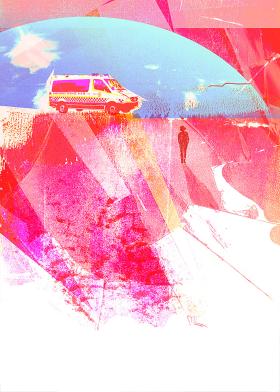
Back at home, I lay exhausted on the couch. The boys climbed over me, snuggling tightly against my body.
‘Will Daddy get better?’
There was no broken neck, no spinal cord damage, but Franco’s skull was fractured in three places and his brain was dangerously swollen.
‘Yes, he’ll be better soon.’
‘Will his bones grow back together?’ ‘Yes, bones mend.’
‘Will he always have bandages?’
‘No baby, no.’
I thought about the glass still in my feet. Meg once told me that her aunt had fallen into a glass cabinet, shattering it, and for years afterwards she’d feel an itch somewhere, scratch it, and a tiny piece of glass would come away beneath her fingers. These fragments had stayed hidden in her body — unknown to her — but they’d worked their way slowly to the surface.
‘Will Daddy be back for my birthday?’ ‘No baby, it’s too soon.’
‘Will Daddy be able to walk?’
‘Yes, he’ll walk soon.’
‘Will Daddy get me a present for my birthday?’
‘I don’t know, darling, you’ll have to wait and see.’
Three weeks later Franco was home, still bandaged and swollen. A nurse came to the house to show me how to change his dressings and to check on the hole in his hip. Franco was not
to drink alcohol for three months, not to play sport for
a year. He watched me suspiciously, as though I had devised this special punishment myself. He refused to eat, his flesh shrinking from his bones. Gaunt and hollow-eyed, he followed my movements around the house, wincing at the raucous sounds of the children playing.
In the morning, I helped him shower. Crouching down to dry the drips from his calves, I looked up at his shuttered face.
‘You know what this means don’t you?’ The words popped from my mouth, unbidden.
‘What?’
I watched Franco’s face, wondering if I should speak the unspeakable. ‘You need a change in lifestyle.’
Franco lifted his naked arms to cover his face, their undersides pale as the moon. He warded off my words, and I clenched my teeth tightly inside my closed mouth.
‘You know that, don’t you’
‘Lil, how can you say those things now?’
I looked away from him, gathering up his dirty clothes. ‘Okay, not yet. But soon. Soon I will say them.’
After two months Franco began to joke and smile and I knew it was time to speak the words. In the kitchen the rosewood benches gleamed in the morning cool. Franco leaned his body half out the sliding door, examining the scars on his arms and hands in the sunlight.
All the things I wanted to say ran through my mind —
Trust is a dead thing in our home.
Like an animal caught somewhere, unseen.
Decaying, slowly, filling the air with a stench we can’t locate.
But when I spoke the words were simple, ‘If you can’t commit to stopping drinking, you’ll have to leave.’
Franco glanced up in surprise. Even after all this, he hadn’t seen it coming.
‘I don’t have to stop. I can just drink a small amount.’ His face was closing over.
‘Franco, I can’t lie awake expecting that call,’ I widened my feet, focusing on the feeling in my legs. Holding my ground.
‘I don’t believe you,’ Franco was all accusation, as though I was lying. ‘What about the kids?’
I thought of my children, their delight in the men at the barbeque. Their hunger to be close. But I had walked over broken glass to get to him. It was enough.
‘You can stay until you can drive again, that’s it.’
Franco shrugged, looking away, and I felt a glimmering of hope deep inside. Freedom loomed. Freedom from the long nights of waiting. Freedom from the weight of all my worst fears —
Fractured spine.
Broken neck.
Brain injury.
Collapsed lung.
Spinal cord damage.
A hole.
Or just plain —
Dead.
Maybe he’d made some kind of deal with himself to never leave me, and his only avenue of escape was to keep crashing his car.
You can leave me. I wanted to say. You don’t have to die.
‘I just can’t do the waiting,’ I murmured instead. ‘The waiting for that call.’
I looked past Franco, through the wide-open doors to the boundless green. The crickets screeched and I closed my eyes, the loud hum vibrating through my mind. When I opened my eyes, Franco had stepped away and the green swelled before me, sun-bright and aglow. I walked outside to stand in the sun, looking up at the sky through the flickering sway of the leaves.
Jessie Cole is the author of the critically acclaimed novels Darkness on the Edge of Town (2013) and Deeper Water (2014). Staying: A Memoir was longlisted for the 2019 Colin Roderick Award and shortlisted for the Victorian Premier’s Literary Award for Non-fiction. Her new memoir, Desire: A Reckoning, has just been published by Text.
This story appears in Openbook spring 2022.

